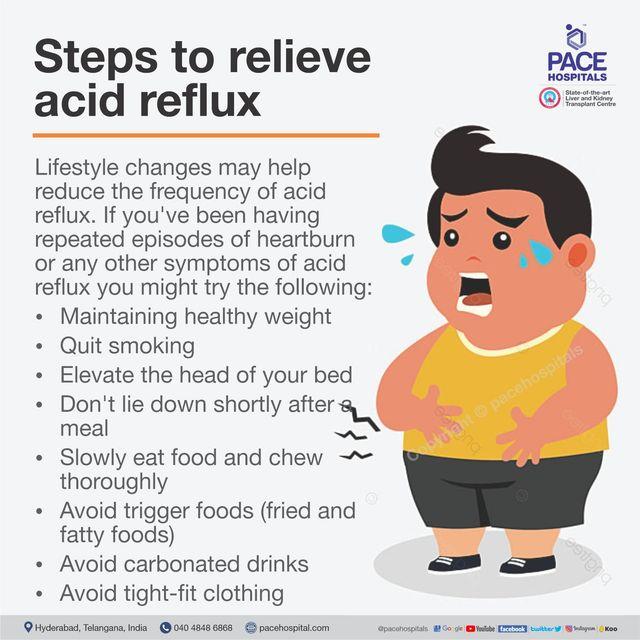Navigating the Waves of Acid Reflux: A Guide to Effective Treatment
In the landscape of digestive health, acid reflux stands out as a common yet often misunderstood condition, casting a shadow over everyday life for millions. Characterized by the unsettling rise of stomach acids into the esophagus, this ailment can transform simple pleasures like dining and socializing into uncomfortable experiences. But fear not—understanding the complexities of acid reflux is the first step towards reclaiming comfort and well-being. In this article, we will explore various treatment options, from lifestyle modifications and dietary adjustments to medical interventions, providing a comprehensive guide for those seeking relief. Join us as we delve into the waves of acid reflux treatment, equipping you with the knowledge to navigate this often turbulent journey towards gastric harmony.
Understanding Acid Reflux: Symptoms and Triggers
Acid reflux, commonly known as gastroesophageal reflux disease (GERD), manifests through a variety of symptoms that can significantly impact daily life. The most prevalent symptom is a burning sensation in the chest, often referred to as heartburn. Other common signs include:
- Regurgitation: The sensation of acid backing up into the throat or mouth.
- Dysphagia: Difficulty swallowing or the feeling of a lump in the throat.
- Coughing: A persistent cough that may worsen at night.
- Hoarseness: Changes in voice due to irritation of the throat.
Identifying potential triggers is essential for managing this condition effectively. Various factors can exacerbate acid reflux, including dietary choices and lifestyle habits. Common triggers include:
- Spicy Foods: Can irritate the lining of the esophagus.
- Caffeine: Found in coffee and sodas, it may relax the lower esophageal sphincter.
- Alcohol: Can increase stomach acid production and relax esophageal muscles.
- Overeating: Larger meals can put pressure on the stomach, pushing acid upward.
Dietary Changes for Effective Acid Reflux Management
Making strategic dietary changes can significantly alleviate the discomfort associated with acid reflux. First, it’s essential to identify and reduce the intake of trigger foods that may exacerbate symptoms. Common culprits include:
- Spicy foods
- Citrus fruits
- Fried or fatty foods
- Tomato-based products
- Chocolate
- Caffeinated beverages
Incorporating more alkaline and fiber-rich foods can promote better digestion and mitigate acid buildup. Consider the following options:
| Food Group | Examples |
|---|---|
| Vegetables | Broccoli, spinach, kale |
| Fruits | Bananas, melons, apples |
| Whole grains | Oats, brown rice, quinoa |
| Lean proteins | Chicken, turkey, fish |
Adjusting meal portions and maintaining regular eating times can also contribute to a healthier digestive process, ultimately helping to manage acid reflux effectively.
The Role of Medications: Options and Considerations
When it comes to managing acid reflux, medications play a crucial role in alleviating symptoms and preventing complications. A variety of options are available, each with distinct mechanisms of action. Antacids, for example, provide quick relief by neutralizing stomach acid, making them ideal for immediate symptom management. In contrast, H2 receptor antagonists and proton pump inhibitors (PPIs) offer longer-term solutions by reducing gastric acid production, helping in the healing of esophageal irritation and preventing future flare-ups. It’s essential to consult a healthcare provider to determine the most suitable medication based on individual needs and health conditions.
While medications can be effective, there are several considerations to keep in mind before starting treatment. Potential side effects may vary by drug class, and long-term use can lead to complications such as vitamin deficiencies or increased risk of gastrointestinal infections. Additionally, lifestyle factors, including diet and stress management, should not be overlooked, as they can significantly influence the frequency and severity of acid reflux symptoms. Here’s a quick overview of common medication options:
| Medication Type | Function | Common Side Effects |
|---|---|---|
| Antacids | Neutralize stomach acid | Constipation, diarrhea |
| H2 Receptor Antagonists | Reduce acid production | Headaches, fatigue |
| Proton Pump Inhibitors | Inhibit acid secretion | Nausea, risk of fractures |
Lifestyle Modifications to Alleviate Reflux Symptoms
Making simple yet effective changes to your daily routine can significantly improve reflux symptoms. Consider focusing on your eating habits and meal timing. Instead of consuming large meals, aim for smaller, more frequent portions to ease the burden on your digestive system. Avoid eating at least 2-3 hours before bedtime to reduce nighttime discomfort. Additionally, keeping a food diary can help identify specific triggers in your diet that exacerbate your symptoms.
Your lifestyle choices also play a crucial role in managing reflux. Regular exercise can promote healthy digestion, but opt for gentle activities like walking or yoga rather than high-impact workouts immediately after eating. It’s also important to monitor your weight, as excess pounds can put pressure on the stomach. Consider the following adjustments:
- Elevate your head while sleeping: Use extra pillows or a wedge to keep your head elevated.
- Avoid tight clothing: Loose-fitting garments can prevent unnecessary pressure on your abdomen.
- Limit alcohol and caffeine: These can relax the lower esophageal sphincter, allowing acid to escape.
Exploring Alternative Therapies for Acid Reflux Relief
For those seeking relief from acid reflux beyond traditional medication, various alternative therapies can provide solace and promote overall well-being. Dietary changes often serve as the cornerstone of these approaches. Incorporating foods such as bananas, oatmeal, and ginger into your meals can help neutralize stomach acid. Additionally, maintaining hydration with herbal teas like chamomile or licorice root may soothe the digestive tract, offering a gentle remedy for discomfort. It is also beneficial to avoid trigger foods, which can include spicy dishes, citrus fruits, and carbonated beverages, allowing for greater control over symptoms.
Another avenue worth exploring is the incorporation of mind-body practices. Techniques such as yoga and meditation not only reduce stress—which can exacerbate acid reflux—but also promote relaxation and improved digestion. Consider engaging in gentle yoga poses, such as the cat-cow stretch or child’s pose, to encourage proper alignment and function of the digestive system. Additionally, acupuncture has gained popularity as a complementary therapy, with studies suggesting it may help alleviate symptoms by balancing energy flow in the body. Integrating these holistic methods can create a comprehensive approach to managing acid reflux and enhancing quality of life.
When to Seek Medical Advice for Persistent Reflux Issues
Experiencing occasional acid reflux can be a common annoyance; however, if symptoms persist, it may indicate a more serious underlying condition. It’s essential to pay attention to the frequency and severity of your symptoms. If you find yourself reaching for antacids more than twice a week, or if your discomfort interferes with daily activities, it’s time to consult a healthcare professional. Additional signs that warrant a conversation with your doctor include:
- Difficulty swallowing
- Unexplained weight loss
- Persistent nausea or vomiting
- Chest pain or discomfort
Don’t overlook the importance of seeking medical advice if you experience any alarming symptoms. Diagnostic tools such as endoscopy or pH monitoring can help your healthcare provider identify the root cause of your reflux. Here’s a simple overview of when to consult a professional:
| Symptom | Action |
|---|---|
| Frequent heartburn | Consult a doctor for evaluation |
| Severe or persistent pain | Seek immediate medical attention |
| Changes in appetite | Discuss with a healthcare provider |
Q&A
Q&A: Understanding Acid Reflux Treatment
Q1: What is acid reflux, and what causes it?
A: Acid reflux occurs when stomach acid flows back into the esophagus, leading to symptoms like heartburn, regurgitation, and discomfort. Common causes include a weakened lower esophageal sphincter, obesity, certain foods (like spicy or fatty meals), alcohol, smoking, and even stress.
Q2: How can lifestyle changes impact acid reflux?
A: Lifestyle modifications can play a pivotal role in managing acid reflux. Simple changes such as maintaining a healthy weight, eating smaller meals, avoiding trigger foods, elevating the head during sleep, and quitting smoking can significantly reduce symptoms. It’s all about finding what works best for your body!
Q3: Are there medications available for acid reflux?
A: Yes, a variety of medications can help alleviate acid reflux symptoms. Antacids neutralize stomach acid, H2 blockers reduce acid production, and proton pump inhibitors (PPIs) block acid production more effectively. It’s essential to consult a healthcare professional before starting any medication to determine the best option for your situation.
Q4: Can natural remedies help with acid reflux?
A: Many people find relief through natural remedies. Options include ginger tea, chamomile, aloe vera juice, and apple cider vinegar. While these can be helpful, it’s wise to discuss them with a healthcare provider to ensure they won’t conflict with other treatments or exacerbate symptoms.
Q5: When should I see a doctor about my acid reflux?
A: If you experience frequent or severe symptoms, such as difficulty swallowing, persistent nausea, or unexplained weight loss, it’s crucial to seek medical advice. These could be signs of a more serious condition, and a healthcare professional can help tailor a treatment plan that suits your needs.
Q6: Is surgery ever necessary for acid reflux treatment?
A: In some cases, surgery may be recommended, particularly for individuals who do not respond to medication or lifestyle changes. Procedures like fundoplication can strengthen the lower esophageal sphincter, reducing acid reflux episodes. Your doctor can provide guidance on whether this is a suitable option for you.
Q7: Can dietary changes make a difference?
A: Absolutely! Keeping a food diary to identify triggers can be a game changer. Incorporating more fruits, vegetables, and whole grains while limiting processed foods, caffeine, and acidic foods can help manage symptoms and improve overall digestive health.
Q8: What’s the long-term outlook for someone with acid reflux?
A: With appropriate treatment and lifestyle adjustments, many individuals experience significant symptom relief. While acid reflux can be a chronic condition, effective management allows most people to lead comfortable, fulfilling lives. Regular check-ups with a healthcare provider can ensure ongoing success in managing the condition.
Q9: Are there any misconceptions about acid reflux treatment?
A: One common misconception is that acid reflux is solely caused by too much stomach acid; however, it can also result from low acid levels or other digestive issues. Additionally, some believe that all medications are harmful; however, when used correctly and monitored by a doctor, they can be very effective in managing symptoms.
Q10: How can I stay informed about the latest acid reflux treatments?
A: Staying informed is key! Follow reputable health organizations, subscribe to medical journals, and consult with your healthcare provider about new research or treatment options. Education empowers you to make informed decisions about your health journey!
—
Feel free to use or adapt this Q&A format for your article on acid reflux treatment!
Insights and Conclusions
navigating the journey of acid reflux treatment can feel overwhelming, but understanding your options is the first step toward relief. From lifestyle adjustments and dietary modifications to over-the-counter remedies and prescription medications, there is a spectrum of strategies available to help manage this common condition. Each individual’s experience with acid reflux is unique, and what works for one person may not work for another. Therefore, it’s crucial to consult with healthcare professionals to tailor a treatment plan that suits your specific needs. By staying informed and proactive, you can take meaningful steps toward reclaiming comfort and wellness in your daily life. Remember, the path to relief is not just about treating symptoms but fostering a healthier relationship with your body. As you explore the myriad of possibilities, may you find the approach that resonates with you, paving the way for a future free from the burdens of acid reflux.
